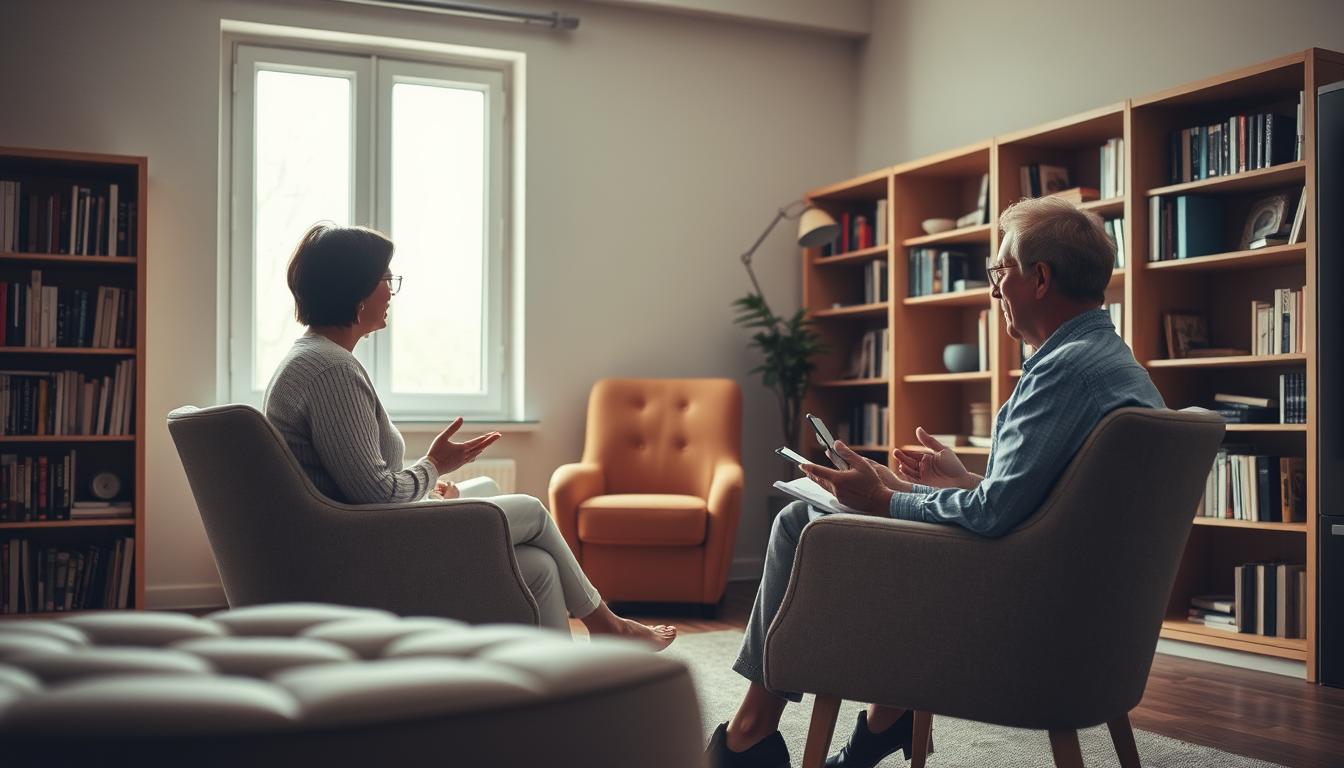
Many people come to therapy for different reasons. They might be dealing with mental health issues, life changes, or personal growth. In individual therapy, you can talk about your thoughts and feelings in a safe place. A skilled therapist helps you set goals and work through past experiences.
This can help you manage symptoms, find better ways to cope, and feel better overall.
Therapy can help with many issues like anxiety, depression, trauma, and relationship problems. It’s also good for those struggling with self-esteem, body image issues, or substance abuse. People often seek therapy for a variety of reasons during big changes or tough times, like a job change, losing someone close, or ending a relationship.
Good therapy offers support, new views, and tools to get through hard times.
When you start therapy, your therapist will help you set goals and make a plan just for you. Going to therapy regularly can help you understand yourself better. It can also improve how you communicate and make you stronger, as well as improve your mental wellness.
Whether you’re facing a specific problem or just want to grow personally, therapy at places like Shield Bearer can help. They offer the support and guidance you need.
Key Takeaways
- Individual therapy addresses a wide range of mental health concerns and life challenges
- Therapy sessions provide a safe space to explore thoughts, feelings, and experiences
- Common issues treated in therapy include anxiety, depression, trauma, and relationship problems
- Effective therapy offers support, new perspectives, and coping strategies
- Seeing a therapist regularly can help improve emotional well-being and personal growth
Introduction to Individual Therapy
Life’s challenges can be tough. Seeking help from a professional through individual therapy to address stressors can be very helpful. This type of therapy, also known as psychotherapy or talk therapy, offers a safe space to talk about your thoughts and feelings. It’s a great way to start improving your mental health and well-being.
In individual therapy, you meet with a therapist one-on-one. They help you understand your thoughts and behaviors better. You can learn new ways to cope and make positive changes in your life. The therapeutic type depends on your goals and the style of the counselor, but common ones include CBT, psychodynamic, and humanistic therapy.
What is Individual Therapy?
Individual therapy is a treatment where you work with a trained therapist to tackle personal challenges. During sessions, common issues people talk about are thoughts, emotions, experiences, and different aspects of life. The therapist listens, asks questions, and offers support to help you see things differently and find ways to cope.
The bond between you and your therapist is very important. It’s based on trust, empathy, and confidentiality. This allows you to share your deepest thoughts and feelings safely. The therapist aims to create a supportive space where you can explore your concerns and grow.
Why Do People Seek Individual Therapy?
Many reasons lead people to seek individual therapy. Some common ones include:
- Anxiety disorders, such as generalized anxiety, social anxiety, and phobias
- Depression and other mood disorders
- Trauma and post-traumatic stress disorder (PTSD)
- Relationship difficulties and interpersonal conflicts
- Self-esteem and body image concerns
- Life transitions, such as career changes, divorce, or grief and loss
- Substance abuse and addiction
- Chronic illness and pain management
Individual therapy is a powerful tool for improving mental health and self-awareness. With the right therapist, you can learn to overcome challenges, build resilience, and achieve your goals. Shield Bearer Counseling Centers is a great place to start, with experienced therapists ready to help you on your journey.

Key Issues Addressed in Individual Therapy
Individual therapy offers a safe space to tackle emotional challenges and mental health issues. At Shield Bearer Counseling Centers, skilled therapists help clients find the root of their problems. They also teach coping strategies and resilience to face life’s hurdles.
Anxiety Disorders: Generalized Anxiety, Social Anxiety, and Phobias
Anxiety and depression are common in individual therapy. Generalized anxiety makes people worry too much and feel restless. Social anxiety makes people fear being judged in social settings, leading to isolation.
Phobias are intense fears of certain objects or situations. Therapists help clients find what triggers their anxiety. They also teach ways to manage symptoms and change negative thoughts.
Depression and Mood Disorders
Depression and anxiety often occur together. Individual therapy is a good way to treat both. Depression can make people feel sad, lose interest in things, and have sleep and appetite changes.
Therapists help find the causes of depression, like past traumas or negative thoughts. They use techniques like cognitive-behavioral therapy (CBT) to help clients change their thinking. This helps them care for themselves and build a support network.
Past Trauma and Post-Traumatic Stress Disorder
Trauma can affect mental health for a long time. PTSD is a common response to trauma, causing flashbacks, avoidance, and being overly alert. Individual therapy is a safe place to deal with trauma.
Therapists use methods like eye movement desensitization and reprocessing (EMDR) or prolonged exposure therapy. These help clients process their trauma and feel safer.
Self-Esteem and Self-Worth
Low self-worth can lead to many mental health issues. In therapy, clients explore why they have negative self-beliefs. These beliefs might come from past experiences, family, or society.
Therapists help clients challenge these negative thoughts. They teach self-compassion and help build a positive self-image. This way, clients become more resilient and well-rounded.
Addressing Life Challenges and Personal Growth in individual therapy sessions
Individual therapy sessions offer a safe space for people to face life challenges. They help with personal growth and self-reflection. Through therapy, people gain insights and learn strategies to handle tough situations.
Relationship Issues and Couples Therapy
Many people seek therapy for relationship problems. These can include communication issues, trust problems, or infidelity. Couples therapy helps partners solve these issues and strengthen their bond.
Therapists teach couples better communication and conflict resolution. This can lead to a more fulfilling partnership.
Self-Esteem and Body Image Concerns
Low self-esteem and negative body image can affect many areas of life. Therapy helps people understand and improve their self-image. Techniques like cognitive-behavioral therapy (CBT) are used to build self-acceptance.
By addressing these issues, individuals can develop a stronger sense of self-worth.
Life Transitions and Adjustments
Life is full of changes, like new jobs or moving cities. These changes can be exciting but also challenging. Therapy offers support during these times. This can include family issues, parenting issues, or marriage counseling.
Therapists help individuals cope with the emotional side of change. They teach strategies to adapt to new situations. This makes the transition smoother and promotes personal growth.
Grief and Loss
Loss, whether of a loved one or a significant change, is painful. Grief is a natural response but can feel overwhelming. Therapy provides a supportive space to process grief.
Therapists help individuals understand their emotions and find ways to heal. This process allows for resilience and hope for the future.
At Shield Bearer Counseling Centers, our therapists help individuals face life’s challenges. We offer a safe space for self-reflection and healing. By focusing on self-care, individuals can improve their well-being and lead more fulfilling lives.

Other Common Issues Addressed in Therapy
Many people seek therapy for reasons like anxiety, depression, trauma, and low self-esteem. But, there are many other issues therapy can help with. At Shield Bearer Counseling Centers, therapists help clients with various challenges. They teach coping strategies and paths to healing.
Substance Abuse and Addiction
Substance abuse and addiction deeply affect a person’s life. They can harm health, relationships, and overall well-being. Therapy helps find the root causes of addiction and teaches healthier ways to cope.
It also helps maintain sobriety. Through counseling, clients tackle addiction’s emotional and psychological sides. This builds a strong base for lasting recovery.
Phobias and Fears
Phobias and fears can greatly limit daily life and enjoyment. Whether it’s fear of flying, public speaking, or specific phobias like arachnophobia, therapy can help. Techniques like exposure therapy and cognitive-behavioral therapy (CBT) help manage anxiety and build confidence.
Chronic Illness and Pain
Chronic illness or pain can be very stressful. It affects emotional well-being and quality of life. Therapy offers a supportive space to deal with emotional challenges.
It helps develop coping strategies and find purpose despite limitations. Techniques like mindfulness, stress management, and cognitive restructuring improve symptoms and well-being.
Other common issues in therapy include:
- Anger management
- Obsessive-compulsive disorder (OCD)
- Intrusive thoughts
- Sleep disorders, such as insomnia
Therapy provides a safe, confidential space for exploring experiences and gaining insights. It helps work towards positive change. With a qualified therapist, individuals can develop skills to navigate life’s challenges and live more fulfilling lives.
Learn about What to Expect in Individual Therapy
The Benefits of Individual Therapy
Going to individual therapy at Shield Bearer Counseling Centers can really help. It boosts emotional well-being and helps you grow as a person. You get to understand yourself better and make real changes.
Improving Emotional Regulation
One big plus of therapy is learning to control your emotions. It’s a safe place to talk about your feelings, even if you feel down or upset. You learn to handle your emotions in a better way, which helps you feel less anxious or depressed.
Gaining New Perspectives
Therapy also helps you see things in a new light. You get to look at your thoughts, actions, and relationships in a different way. This helps you understand yourself better and make positive changes in your life.
Building Coping Strategies
Therapy teaches you ways to deal with tough times. Whether it’s stress, trauma, or bad habits, you learn how to handle it. You might learn:
- Mindfulness and relaxation techniques
- Communication and assertiveness skills
- Problem-solving and goal-setting
- Self-care and stress management
Using these strategies can make your life better. You’ll be able to handle hard situations more easily.
| Benefit | Description |
| Emotional Regulation | Learning to identify, understand, and manage emotions effectively |
| New Perspectives | Gaining insight into thoughts, behaviors, and relationships |
| Coping Strategies | Developing practical tools to navigate challenges and build resilience |
Learn more about The Benefits Of One-On-One Counseling.
Conclusion
Individual therapy is a strong tool for tackling many mental health issues. It helps with anxiety, depression, and relationship problems. A good therapist offers support and guidance to overcome challenges and grow personally.
Exploring thoughts, emotions, and life events in a safe space is key. This way, people can understand themselves better and find ways to cope.
Struggling with PTSD or relationship issues? Individual therapy can help. A therapist can improve communication and strengthen relationships. They also help manage physical and mental health issues.
At Shield Bearer Counseling Centers in Houston, Texas, you can find affordable therapy. Taking the first step towards healing is important. With the right support, you can overcome tough issues and live a happier, healthier life.
FAQ – Common Issues Treated in Therapy
What is individual therapy?
Individual therapy is a one-on-one mental health treatment. It’s tailored to meet each person’s unique needs. The therapy type depends on the client’s needs, symptoms, and the therapist’s approach.
Why do people seek individual therapy?
People seek therapy for many reasons. They might face work or social pressures, personal challenges, or life changes. Therapy offers a safe space to explore feelings and thoughts with a professional’s help.
What are some common mental health concerns addressed in individual therapy?
Therapy helps with many mental health issues. This includes anxiety, depression, trauma, and self-esteem problems. It aims to improve mental health.
How can individual therapy help with relationship issues?
Therapy can help with relationship problems like communication or trust issues. Therapists help improve communication and rebuild trust. This strengthens relationships.
Can individual therapy help with substance abuse and addiction?
Yes, therapy helps with substance abuse and addiction. Therapists help clients manage addictive behaviors and stay sober. They work on identifying triggers.
How can individual therapy benefit emotional well-being?
Therapy helps with emotional regulation. It allows better management of feelings. Through therapy, clients gain new insights and grow personally.
What can I expect from individual therapy sessions?
In therapy, you’ll discuss your thoughts and feelings in a safe space. Your therapist will help set goals and find coping strategies. They’ll address the issues you face.
How can I find an affordable therapist?
Shield Bearer Counseling Centers in Houston, Texas, offers affordable counseling. Many therapists have sliding scale fees or accept insurance. This makes therapy more accessible.